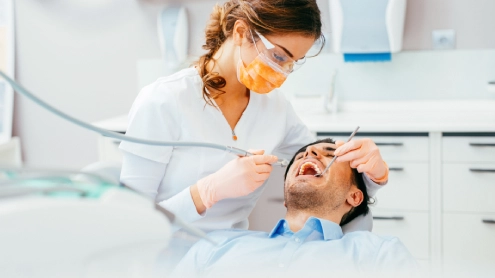In recent years, vaping has emerged as a popular alternative to traditional tobacco smoking. Proponents tout it as a safer option, with fewer adverse health effects.
However, as vaping continues to gain traction, concerns have arisen regarding its potential impact on oral health. In this retrospective, we'll explore the relationship between vaping and oral health, examining the potential risks and implications associated with this trend.
Nicotine, a common ingredient in vaping liquids, can have detrimental effects on oral health. Nicotine constricts blood vessels, reducing blood flow to the gums and compromising their ability to fight off infection and inflammation. This can increase the risk of gum disease and hinder the body's ability to heal oral wounds. Additionally, nicotine can contribute to bruxism (teeth grinding), which can lead to tooth wear and jaw pain over time.
Many vaping liquids contain flavoring agents, which add taste and aroma to the vapor. While these flavorings may enhance the vaping experience, some studies suggest that certain flavoring compounds can be harmful to oral health.For example, sweet and fruity flavors may increase the risk of cavities by providing an ideal environment for cavity-causing bacteria to thrive. Additionally, some flavoring agents have been linked to oral irritation and inflammation.
The oral microbiome plays a crucial role in maintaining oral health, helping to regulate pH levels, fight off harmful bacteria, and support overall immune function. Emerging research suggests that vaping may disrupt the balance of the oral microbiome, altering bacterial populations and increasing the risk of oral diseases. This imbalance could potentially lead to conditions such as oral thrush, periodontal disease, and oral cancer.
Vaping can sometimes cause oral irritation and sensitivity, particularly among individuals who are sensitive to certain chemicals or ingredients found in vaping liquids. This can manifest as soreness, redness, or burning sensations in the mouth, gums, or throat. Prolonged exposure to these irritants may exacerbate existing oral conditions and increase discomfort over time.
One common side effect of vaping is dry mouth, also known as xerostomia. The act of inhaling vapor can reduce saliva production, leading to a dry, uncomfortable feeling in the mouth. Saliva plays a crucial role in oral health by rinsing away food particles, neutralizing acids, and protecting against bacterial growth. When saliva production is compromised, the risk of tooth decay, gum disease, and oral infections may increase.
Some vaping liquids contain ingredients that can stain the teeth over time, similar to the staining caused by traditional tobacco products. Nicotine and certain flavoring agents may contribute to yellowing or discoloration of the teeth, detracting from their appearance and impacting overall smile aesthetics. This staining can be difficult to remove through regular brushing and may require professional dental cleaning or whitening treatments to address.
For individuals undergoing dental procedures or oral surgeries, vaping may interfere with the body's ability to heal properly. Nicotine and other chemicals found in vaping liquids can impair blood flow to the surgical site, slowing down the healing process and increasing the risk of complications such as infection or delayed wound healing. Dentists and oral surgeons often advise patients to abstain from vaping and smoking in the days leading up to and following oral procedures to optimize healing outcomes.
While research on the link between vaping and oral cancer is still limited, some studies suggest that certain chemicals found in vaping liquids may have carcinogenic properties. Chronic exposure to these substances may increase the risk of developing oral cancer, particularly in individuals who vape regularly or for an extended period. It's essential for individuals who vape to be aware of this potential risk and to prioritize regular oral cancer screenings as part of their overall healthcare routine.
Vaping has been shown to have an impact on oral microcirculation, which refers to the small blood vessels and capillaries within the oral tissues. Nicotine and other components of vaping liquids can constrict blood vessels, reducing blood flow to the gums and other oral tissues. This can compromise the delivery of oxygen and nutrients to the cells, impairing tissue health and increasing the risk of oral complications such as gum disease and delayed wound healing.
While vaping may be perceived as a less harmful alternative to traditional smoking, it is not without its risks, particularly when it comes to oral health.
The chemicals and aerosols present in vaping liquids, along with the effects of nicotine and flavoring agents, can have a negative impact on oral hygiene, gum health, and the oral microbiome.
As such, individuals who vape should be mindful of their oral health and take steps to mitigate potential risks, such as maintaining good oral hygiene practices, monitoring nicotine intake, and seeking regular dental care.
Additionally, further research is needed to fully understand the long-term effects of vaping on oral health and to develop evidence-based strategies for prevention and intervention.









